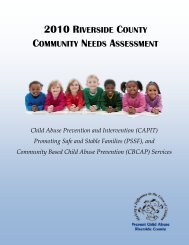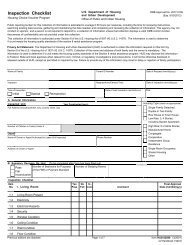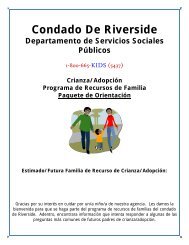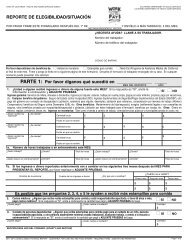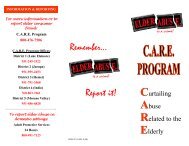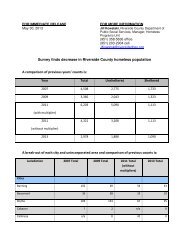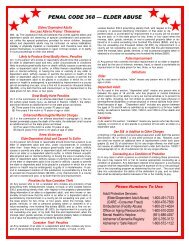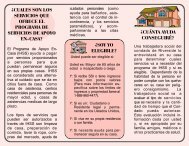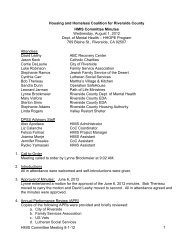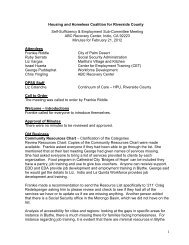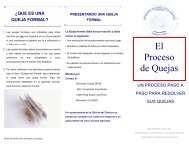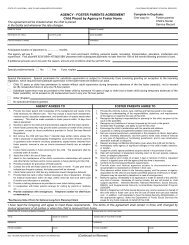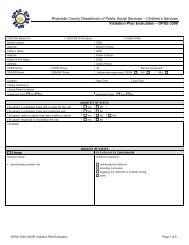PUB 13(legal)NEW3–07.qxd - California Department of Public ...
PUB 13(legal)NEW3–07.qxd - California Department of Public ...
PUB 13(legal)NEW3–07.qxd - California Department of Public ...
Create successful ePaper yourself
Turn your PDF publications into a flip-book with our unique Google optimized e-Paper software.
AT THE HEARING<br />
If you have notified the State Hearings Division before your hearing that<br />
you need language services, a state-approved interpreter will be present<br />
at your hearing to assist you and the other participants. You should be<br />
prepared to present your best case at the hearing. You will have an<br />
opportunity to tell the Administrative Law Judge why you disagree with<br />
the county’s action and the county representative will have an<br />
opportunity to explain why the action was taken. It is up to the county to<br />
prove that its action is correct. You and the county representative may<br />
question each other and any witnesses who are present. The<br />
Administrative Law Judge may also ask questions to bring out all the<br />
facts.<br />
State law requires that all hearings are to be tape recorded. The<br />
recording is for use in making the decision and is kept in case there is<br />
a dispute about the decision.<br />
THE DECISION<br />
After the hearing is completed, the Administrative Law Judge will<br />
either send a proposed decision to the Director <strong>of</strong> the <strong>California</strong><br />
<strong>Department</strong> <strong>of</strong> Social Services or Health Services or will issue a final<br />
decision on behalf <strong>of</strong> the Director. If a proposed decision is sent to the<br />
Director, the facts presented during the hearing will be studied and the<br />
Director will either adopt the proposed decision, order a further<br />
hearing, or issue his/her own decision. If the Director issues his/her<br />
own decision, that decision is binding, but you will also receive a copy<br />
<strong>of</strong> the Administrative Law Judge’s original proposed decision.<br />
Immediately upon receipt <strong>of</strong> a decision, the county must comply with<br />
the decision even if a rehearing is requested. If the decision is a denial,<br />
any aid pending which you had been receiving will stop. In addition,<br />
the county can demand repayment <strong>of</strong> excess cash aid or food stamps<br />
which were paid as aid pending. If you disagree with the decision, you<br />
may request a rehearing by following the instructions on the first page<br />
<strong>of</strong> the State Hearing decision you receive.<br />
If you disagree after receiving either a decision or a rehearing decision,<br />
you can seek judicial review by appealing to Superior Court. The<br />
request for judicial review must be filed with the court within one year<br />
after receiving notice <strong>of</strong> the Director’s final decision.<br />
WITHDRAWING FROM A STATE HEARING<br />
You may withdraw (cancel) your request for a State Hearing any time<br />
before the Director has issued a decision by sending a written request<br />
to the State Hearings Division in Sacramento. If you withdraw before<br />
the hearing, it will be cancelled. If you withdraw after the hearing, no<br />
decision will be issued. In both cases, the county’s action will take<br />
effect. If you received aid at a level greater than you should have<br />
received if you had not requested the hearing, and you later withdraw<br />
before the decision is issued, the county has a right to demand<br />
repayment <strong>of</strong> the overpaid amount <strong>of</strong> cash aid or food stamps. The<br />
result is the same as a written decision supporting the county’s action.<br />
RECORDS ARE IMPORTANT<br />
Every hearing is different. The Administrative Law Judge will want to<br />
see papers or records which give facts and provide verification<br />
regarding your case. You should bring to the hearing records that will<br />
prove or disprove a fact upon which you and the county disagree.<br />
Records relating to the specific disputed matter are <strong>of</strong>ten required to<br />
correctly resolve a case. Examples are:<br />
• Records relating to real property, such as tax receipts, deeds, contracts<br />
and mortgages.<br />
• Records relating to personal property, such as bank books, insurance<br />
policies, automobile ownership papers, stocks, bonds, notes and<br />
contracts.<br />
• Records relating to disability, such as medical reports, hospital<br />
records, or doctor’s notes.<br />
• Records regarding money you receive, such as: wage stubs; award<br />
letters showing how much you receive from Social Security;<br />
Unemployment Insurance; Veterans Benefits; court-ordered support<br />
payments; student financial aids; from property rental; boarders;<br />
roomers; stocks; bonds; or payments made on your behalf, including<br />
gifts, etc.<br />
• Bills and receipts showing the amount you are paying for housing,<br />
utilities (including telephone), medical care (including health<br />
insurance and medical transportation), union dues, attendant and child<br />
care, school tuition and fees, disaster and casualty losses.<br />
Discrimination<br />
Under State law, welfare agencies may not, on the basis <strong>of</strong> race, color,<br />
national origin, age, disability, religion, sex, sexual orientation, political<br />
affiliation or marital status, provide aid, benefits or services to an<br />
individual or group which is different from that provided to others.<br />
Federal laws also prohibit discrimination on several, although not all, <strong>of</strong><br />
the bases listed above.<br />
Federal law prohibits: (1) delaying or denying the placement <strong>of</strong> a child for<br />
adoption or into foster care on the basis <strong>of</strong> the race, color or national<br />
origin <strong>of</strong> the adoptive or foster parent, or the child involved; (2) denying<br />
to any individual the opportunity to become a foster or adoptive parent on<br />
the basis <strong>of</strong> the race, color or national origin <strong>of</strong> the individual or child<br />
involved.<br />
If you believe you have been discriminated against by the welfare agency,<br />
you may take any <strong>of</strong> the following actions:<br />
1. Speak to the County Welfare <strong>Department</strong>’s Civil Rights<br />
2.<br />
Representative. The county will investigate the complaint and<br />
inform you <strong>of</strong> the outcome.<br />
You may file a discrimination complaint with CDSS by e-mail,<br />
writing or calling:<br />
<strong>California</strong> <strong>Department</strong> <strong>of</strong> Social Services<br />
Civil Rights Bureau (CRB)<br />
P.O. Box 944243, M.S. 15-70<br />
Sacramento, CA 94244-2430<br />
Call (916) 654-2107 or toll free 1-866-741-6241<br />
E-Mail: crb@dss.ca.gov<br />
TDD/TTY Users may call direct at (916) 654-2098 or<br />
collect by calling (800) 688-4486 or you may call via the<br />
<strong>California</strong> Relay Service operator at (800) 735-2929.<br />
3. If your complaint involves the Food Stamp Program, you may<br />
file a federal discrimination complaint with:<br />
USDA , Director<br />
Office for Civil Rights<br />
Room 326-W, Whitten Building<br />
14th and Independence Avenue, SW<br />
Washington, D.C. 20250-9410<br />
1-800-795-3272 (voice)<br />
(TTY) 202-720-6382<br />
4. If your complaint involves assistance programs other than<br />
Food Stamps, and if you believe that the alleged<br />
discriminatory action was based on race, color, national origin,<br />
age, or disability, you may file a federal discrimination<br />
complaint with:<br />
U.S. <strong>Department</strong> <strong>of</strong> Health and Human Services<br />
Office for Civil Rights<br />
50 United Nations Plaza, Room 322<br />
San Francisco, CA 94102<br />
1-800-368-1019<br />
A complaint must be filed within 180 days <strong>of</strong> the occurrence <strong>of</strong> the<br />
alleged discrimination. In your complaint, state the basis <strong>of</strong><br />
discrimination (e.g., race, disability, sex), what happened, why you<br />
believe that the action was taken, and the resolution you are seeking.<br />
If you disagree with the county’s decision on your discrimination<br />
complaint, you may appeal the finding to the <strong>California</strong> <strong>Department</strong><br />
<strong>of</strong> Social Services or, if it involves the Food Stamp program, to the<br />
U.S. <strong>Department</strong> <strong>of</strong> Agriculture. THE DISCRIMINATION<br />
COMPLAINT PROCESS DIFFERS FROM THE STATE<br />
HEARING PROCESS. YOU HAVE THE RIGHT TO REQUEST A<br />
STATE HEARING IF YOU BELIEVE THAT THE COUNTY<br />
MADE AN INCORRECT DECISION ON YOUR BENEFITS IN<br />
ADDITION TO FILING A DISCRIMINATION COMPLAINT.<br />
In Conclusion<br />
If you have any question about the information in this paper—your rights<br />
or what you should do if you think your rights have been violated—ask<br />
someone in your county welfare department or talk with someone at<br />
<strong>Public</strong> Inquiry and Response, <strong>California</strong> <strong>Department</strong> <strong>of</strong> Social Services.<br />
Also, it may be helpful to obtain written information which explains the<br />
public assistance for which you are applying or receiving. It is available<br />
at your county welfare department. If a leaflet about the program is not<br />
<strong>of</strong>fered to you, ask for it. One way to ensure that you are treated fairly<br />
is to know what you are entitled to receive.<br />
STATE OF CALIFORNIA<br />
HEALTH AND HUMAN SERVICES AGENCY<br />
DEPARTMENT OF SOCIAL SERVICES<br />
This publication is available in large print and also on audio tape<br />
upon request from your county.<br />
You should tell the county if you have a disability and need help<br />
applying for or continuing to receive aid, benefits, and services.<br />
<strong>PUB</strong> <strong>13</strong> (3/07)<br />
YOUR RIGHTS<br />
Under <strong>California</strong><br />
Welfare Programs<br />
★ ★ ★ ★ ★ ★ ★ ★ ★ ★<br />
★ ★ ★ ★ ★ ★ ★ ★ ★ ★<br />
If you are applying for, receiving, or have received public<br />
assistance in <strong>California</strong>, you have specific rights.<br />
This brochure describes your rights and explains what you<br />
can do if you have a complaint. The information is for<br />
persons applying for, receiving, or who have received aid or<br />
services in any <strong>of</strong> the following assistance programs:<br />
Adoption Assistance Program (AAP)<br />
Alcohol and Drug Program<br />
<strong>California</strong> Food Assistance Program (CFAP)<br />
<strong>California</strong> Medical Assistance (Medi-Cal)<br />
<strong>California</strong> Work Opportunity and Responsibility to<br />
Kids (CalWORKs)<br />
CalWORKs Child Care<br />
CalWORKs Welfare to Work Program<br />
Cash Assistance Program for Immigrants (CAPI)<br />
Child Welfare Services<br />
Denti-Cal<br />
Early & Periodic Screening, Diagnosis, and Treatment<br />
(EPSDT)<br />
Food Stamps<br />
Foster Care<br />
In-Home Supportive Services (IHSS)<br />
Kinship Guardian Assistance Payment (Kin-GAP)<br />
Mental Health<br />
Multipurpose Senior Service Program (MSSP)<br />
Personal Care Services Program (PCSP)<br />
Refugee Cash Assistance<br />
Social Services
If you have a complaint concerning a grant issued by the county<br />
(general assistance/general relief), you must file a request with<br />
the county in order to get your complaint resolved.<br />
If you have a complaint concerning the Supplemental Security<br />
Income/State Supplementary Program, you must discuss the<br />
problem with someone at the Social Security Administration<br />
Office nearest your home. The Social Security Administration<br />
handles complaints and conducts hearings in the aid programs<br />
for aged, blind and disabled persons.<br />
Multi-Lingual Services<br />
If you or someone you know has problems applying<br />
for or receiving public assistance because you or that<br />
person do not speak English, ask for help from<br />
someone who speaks your language. You have a right<br />
to interpreter services provided by the county. If your<br />
county welfare <strong>of</strong>fice does not have an employee with<br />
whom you can talk, call 1-866-741-6241 for help. You<br />
will not have to pay for the call.<br />
Your Rights<br />
As a person applying for or receiving public assistance in<br />
<strong>California</strong>, you have the right:<br />
★ To receive a written explanation <strong>of</strong> the decision on your<br />
application.<br />
★ To receive a written explanation when any change is<br />
made in your eligibility, benefits or services plan.<br />
★ To appeal any decision on your eligibility, benefits or<br />
service plan.<br />
★ To see any information related to your eligibility which<br />
you provide to the county. You may inspect your entire<br />
case record if you request a State Hearing (see the<br />
“What You Can Do” section <strong>of</strong> this brochure).<br />
★ To file a complaint when you believe you have been<br />
discriminated against because <strong>of</strong> race, color, religion,<br />
sex, sexual orientation, national origin, political<br />
affiliation, disability, marital status or age.<br />
★ To be treated with courtesy, consideration and respect.<br />
★ To be given the same consideration and treatment as all<br />
other applicants or recipients regardless <strong>of</strong> race, color,<br />
religion, sex, sexual orientation, national origin, political<br />
affiliation, disability, marital status or age.<br />
★ To have the information in your case record kept<br />
confidential except as otherwise stated by State and<br />
federal law.<br />
★ To have personal privacy. However, certain personal<br />
information is required to determine your eligibility and<br />
need for public assistance.<br />
When applying for or receiving public assistance, your rights<br />
must be respected by all persons and organizations, including<br />
county welfare departments, boarding homes and institutions, day<br />
nurseries, work or training program personnel, hospitals, nursing<br />
homes, doctors, dentists and druggists.<br />
☎<br />
A Telecommunication Device for the<br />
Deaf (TDD) is available at the <strong>California</strong><br />
<strong>Department</strong> <strong>of</strong> Social Services (CDSS). If you have<br />
a complaint about public assistance services, you<br />
may contact us using a TDD by calling toll free<br />
1-800-952-8349.<br />
What You Can Do<br />
If you don’t agree with an action on your application, public assistance<br />
benefits or service plan, you can do any or all <strong>of</strong> the things listed below.<br />
1. Talk with someone at your county welfare department. Explain why<br />
you disagree and ask for help.<br />
2. File a formal complaint against the county with the <strong>California</strong><br />
<strong>Department</strong> <strong>of</strong> Social Services. To do so, call toll free or write:<br />
<strong>Public</strong> Inquiry and Response<br />
P.O. Box 944243, M.S. 6-23<br />
Sacramento, <strong>California</strong> 94244-2430<br />
Phone 1-800-952-5253 (Voice)<br />
1-800-952-8349 (TDD)<br />
FAX 1-916-229-4110<br />
State that you want your problem to be handled as a “complaint” and<br />
give the reason for the complaint. Social Services will notify the<br />
county welfare department <strong>of</strong> the complaint, and the county will<br />
review the facts in your case. If the county determines that you are<br />
entitled to an adjustment, your complaint may be settled without<br />
further action on your part or on the part <strong>of</strong> Social Services.<br />
3. Request a State Hearing before an Administrative Law Judge.<br />
YOU MUST MAKE YOUR REQUEST FOR THE STATE<br />
HEARING WITHIN 90 DAYS (NOT THREE MONTHS) OF<br />
THE COUNTY’S ACTION. The 90-day period applies even though<br />
you have filed a complaint. The 90-day period begins to run when the<br />
county mails you a notice <strong>of</strong> action.<br />
If you decide to request a State Hearing because your aid is going to<br />
be reduced or stopped, you may continue to receive the same aid you<br />
have been getting until the hearing, if you make your request for<br />
hearing before the effective date <strong>of</strong> the action. Your food stamps can<br />
continue unchanged only until the end <strong>of</strong> your current certification<br />
period. If the hearing decision is not in your favor, an overpayment<br />
may occur in the amount <strong>of</strong> excess cash aid and extra value <strong>of</strong> food<br />
stamps you received while the hearing was pending.<br />
Also, it is a good idea to save the envelope from the Notice <strong>of</strong> Action<br />
to show to the Administrative Law Judge. The date is important.<br />
To make a request for a State Hearing, fill in the “Request for State<br />
Hearing” space on the back <strong>of</strong> the Notice <strong>of</strong> Action form. If you have<br />
trouble understanding English, tell us your language and dialect. You<br />
may write a letter which explains the county action which you believe<br />
was incorrect and your need for language help. Send your hearing<br />
request to the county welfare department at the address indicated on<br />
the Notice <strong>of</strong> Action.<br />
A request for a State Hearing may also be made orally. This can be<br />
done by telephoning the toll free number at 1-800-952-5253 or if<br />
you are hearing impaired call 1-800-952-8349 (TDD).<br />
State Hearings<br />
This is a hearing with you, an Administrative Law Judge from the<br />
<strong>California</strong> <strong>Department</strong> <strong>of</strong> Social Services, and a representative <strong>of</strong> the<br />
county. It is not a court hearing. You may, if you wish, have a lawyer or<br />
other representative present with you at your cost. You may bring<br />
witnesses.The Administrative Law Judge is in charge <strong>of</strong> the hearing,<br />
which is not open to the public.<br />
TIME AND PLACE OF HEARING<br />
At least 10 days before your hearing, the <strong>California</strong> <strong>Department</strong> <strong>of</strong> Social<br />
Services will send you a letter with the exact date and place <strong>of</strong> the<br />
hearing. In some counties, you will also be told an exact time for the<br />
hearing. In other counties, you will be scheduled for either a morning or<br />
afternoon time slot. Most hearings will begin at either 8:30 a.m. or 1:00<br />
p.m. Because several hearings will be scheduled to begin at these times,<br />
you should anticipate that there may be some delay before your hearing<br />
actually starts. There is no child care provided at the hearing location.<br />
Hearings are usually held at public buildings in the county. If you are<br />
unable to attend the hearing at the hearing location for reasons <strong>of</strong> poor<br />
health or disability, the hearing may be held in your home, in another<br />
agreed upon location, or by telephone with your agreement. To have a<br />
home hearing, medical verification may be required. If you believe you<br />
may qualify for a home hearing or wish to have a telephone hearing, call<br />
or write the State Hearings Division to explain your reason(s):<br />
State Hearings Division<br />
P.O. Box 944243 MS 19-37<br />
Sacramento, CA 94244-2430<br />
1-800-743-8525<br />
If you move after requesting a State Hearing but before it is heard or a<br />
decision issued, you should notify the State Hearings Division <strong>of</strong> your<br />
new address by calling toll free 1-800-743-8525 (Voice/TDD).<br />
If you are no longer a resident <strong>of</strong> the State <strong>of</strong> <strong>California</strong>, arrangements<br />
will be made to conduct your hearing by telephone. Instructions<br />
concerning telephone hearing procedures will be sent to you in advance<br />
<strong>of</strong> the hearing.<br />
POSITION STATEMENTS<br />
You are allowed to have a copy <strong>of</strong> the county’s typewritten Position<br />
Statement before the hearing. This is a typewritten statement which<br />
explains what the county has done and the reasons for the county action.<br />
You may pick up this statement any time during business hours in the two<br />
working days before your date <strong>of</strong> hearing unless the county is not<br />
involved with the hearing. You may call your county appeals unit to make<br />
sure that these papers are ready.<br />
If the papers are not ready, or if the county substantially changes the papers<br />
after giving them to you, you have the right to have the hearing postponed<br />
for good cause. This means that your hearing will be rescheduled and any<br />
aid pending the hearing will be continued. You may pick up the statement<br />
from the Appeals Worker at the County Welfare <strong>Department</strong>.<br />
At the hearing you also may submit a written statement explaining your<br />
position on the issue to be considered by the Administrative Law Judge.<br />
Both the county’s Position Statement and your written statement will<br />
become part <strong>of</strong> the hearing record and will be reviewed by the<br />
Administrative Law Judge.<br />
POSTPONEMENTS<br />
If you want to postpone the hearing and your hearing involves the<br />
Food Stamp program, you may request and will receive an automatic<br />
first postponement. In any other case in which you wish to receive a<br />
postponement, you must notify the state prior to the hearing and<br />
present a good reason for the postponement. Send a written request to<br />
the State Hearings Division or call toll free at 1-800-743-8525<br />
(Voice/TDD).<br />
If you do not appear at a scheduled hearing and still want a hearing,<br />
you must request that the hearing be reopened within 10 days from the<br />
date <strong>of</strong> the scheduled hearing and show a good reason why you did not<br />
attend your scheduled hearing.<br />
BEFORE THE HEARING<br />
You must either attend the hearing yourself or authorize someone<br />
to appear for you. If you plan to have someone appear for you, send<br />
the name, address and telephone number <strong>of</strong> your representative to the<br />
State Hearings Division before your scheduled hearing date. You may<br />
obtain a list <strong>of</strong> <strong>legal</strong> services representatives, voluntary <strong>legal</strong> service<br />
persons, or welfare rights organizations from the county. You must<br />
also sign a written statement authorizing your representative to appear<br />
on your behalf. This statement should be sent to the county and to the<br />
State Hearings Division.<br />
You may go to the hearing with your representative and you may ask<br />
others who know the facts to be present at the hearing to tell the<br />
Administrative Law Judge what they know about the case. If you want<br />
to have a person or papers important to your case at your hearing, you<br />
may request that a subpoena be issued. To request a subpoena before<br />
the date <strong>of</strong> the hearing, write or call the <strong>of</strong>fice listed below which is<br />
closest to you:<br />
State Hearings Division<br />
P.O. Box 944243<br />
M.S. 19-44<br />
Sacramento, CA 94244-2430<br />
Phone (916) 229-4187<br />
State Hearings Division<br />
Bay Area Regional Office<br />
1515 Clay Street, #1203<br />
Oakland, CA 94612<br />
Phone (510) 622-4000<br />
State Hearings Division<br />
811 Wilshire Boulevard,<br />
Suite 1118<br />
Los Angeles, CA 90017<br />
Phone (2<strong>13</strong>) 833-2200<br />
State Hearings Division<br />
355 West Grand Ave.,<br />
Suite 4<br />
Escondido, CA 92025-2649<br />
Phone (760) 735-5070<br />
State Hearings Division<br />
2550 Mariposa Mall,<br />
#3088<br />
Fresno, CA 93721<br />
Phone (559) 445-5775<br />
Tell us the name <strong>of</strong> the person or describe the documents you want<br />
subpoenaed, and tell why they are important to your hearing. The<br />
Presiding Administrative Law Judge will determine if a subpoena<br />
should be issued. It will be your responsibility to serve the person you<br />
want subpoenaed, or the custodian <strong>of</strong> the records if you want to obtain<br />
a document.<br />
You have a right to look at your case records and the regulations<br />
before the hearing. Call your county appeals unit to arrange this<br />
review.



